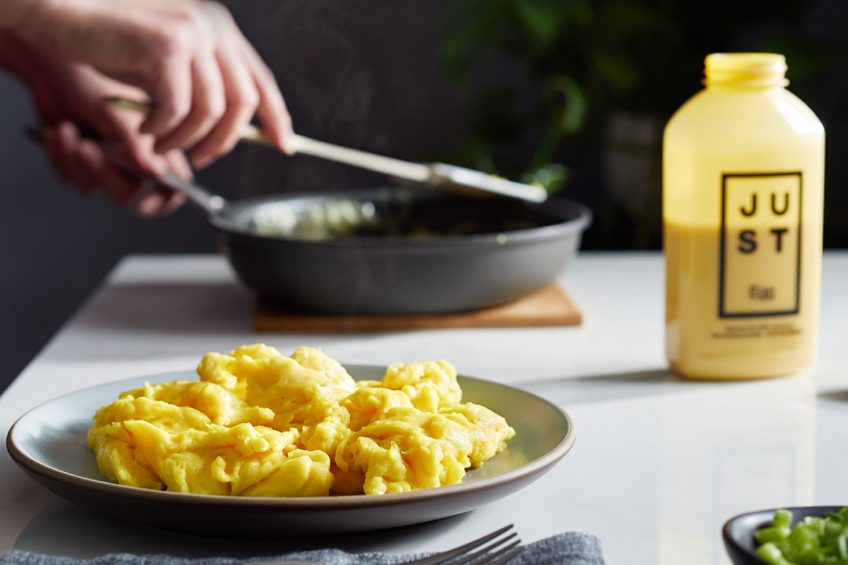Synthetic egg company partners with German poultry giant

The past few years have seen egg farmers in Europe battling to keep up with consumer requirements. First battery cages were banned. More recently their replacement, enriched cages, have come under scrutiny after less than a decade in use – could a synthetic egg fit the bill? Some of Europe’s largest poultry businesses seem to think it might.
Type “Just Egg Scrambled” into YouTube and you will receive links to nearly a hundred thousand videos. Scroll through the top selection and, rather than cooking tutorials, most videos will be vegan cooks reviewing a scrambled egg substitute produced by San Francisco start-up JUST Inc – and they are almost universally excited about it. Understandable. But watching one of the videos gives an indication as to why – it scrambles like a normal egg into a texture that would be familiar to anyone who has ever cooked the dish. What’s more, those who have tasted it (it’s currently only on sale in the US) say it manages to replicate the taste and texture of eggs incredibly well. To top it off, JUST says that the nutritional elements are close to that of a real egg, minus the cholesterol. Poultry producers – be aware.
Product Range
The secret is mung beans, which contain a protein that scrambles like egg when warmed through, along with a complex array of other plant proteins that mix together to synthesise eggs. And it is just a start for the company founded in California back in 2011 by Josh Balk and Joshua Tetrick. The duo first brought Beyond Eggs to the market in early 2013, a powdered egg supplement that it later pulled from retail (but continued to sell to food service companies). Its flagship product, Just Mayo came later that year, and since then the range has grown to include cookie dough, a nutrient-rich porridge called Powder Gari aimed at developing nations and Just Egg – the scrambled egg substitute. It is also developing cultured chicken, produced entirely from replicated cells grown in a lab (see box, cell-produced meat).
Other synthetic foodstuffs Meat and egg substitutes are undoubtedly growing in popularity, and there is serious money being invested in finding ways to reduce food’s environmental impact. They broadly fall into 2 categories: Meat and egg substitutes are undoubtedly growing in popularity, and there is serious money being invested in finding ways to reduce food’s environmental impact. They broadly fall into 2 categories:
The list below starts with straightforward meat-replacement products and ends with the most cutting edge work to reproduce real meat. Beyond MeatCreates burgers and sausages purely from plants and says that: “By shifting from animal, to plant-based meat, we can positively and significantly impact 4 growing issues attributed to livestock production and consumption: human health, climate change, natural resource depletion, and animal welfare.” The Impossible BurgerImpossible Burger arguably takes it a step further, using a genetically modified molecule that it says gives its burgers the juicy, meaty taste that vegetable-based meat substitutes often lack. JUST ChickenNot content with replicating egg with plant compounds, JUST is also working on a cell-cultured chicken nugget, which it hopes to launch this year. It has successfully created poultry meat from cells gathered off the feather of a chicken – without killing the animal. Aleph FarmsAt the end of 2018, Israeli tech firm Aleph Farms produced a steak from cells in a lab that had a muscle-like texture. Previously cell-grown meat had only been produced in unstructured forms like nuggets or burgers. The company achieved this by using a mixture of different cell types grown on a ‘scaffold’. The cost, too, is significantly lower. The first beef burger to be grown in a lab cost about € 250,000 to make, whereas a small strip of the steak was made for just $ 50. Didier Toubia, the co-founder and chief executive of firm said at the time: “It’s close and it tastes good, but we have a bit more work to make sure the taste is 100% similar to conventional meat. But when you cook it, you really can smell the same smell of meat cooking.” |
On a mission
Why go to the effort? “JUST is on a mission to build a food system where everyone eats well,” chief executive Joshua Tetrick tells Poultry World. He is evangelical about the potential that research has to supplant or even replace conventional poultry production. While he feels there will be a place for conventional livestock production in 10 years’ time, it will be part of a food system that relies on synthetic production as well. “New methods of producing food are going to be required, as population projections soar to 9.7 billion by 2050. In my opinion, a decade from now, farming will take many forms – some new, some conventional.”

Growth
For anyone thinking that this is still some way away, consider the company’s successes to date – and the money behind it. According to reports it has raised more than US$ 120m in funding – some of which has come from seriously high-profile investors intent on changing the world as much as attracting a return. Think Bill Gates, or Hong Kong-based billionaire and philanthropist Li Ka-shing.
Its scrambled egg product launched in the US in October last year and sold the plant-based equivalent of 3 million chicken eggs in its first 4 months. It’s not the lowest cost either – eggs are priced on par with ‘premium’ egg equivalents, and cost between 2- and 3-times as much as the cheapest egg on the market. But, as Mr Tetrick says: “As we’re always working on improving the functionality of the product, we’re also working to bring the cost down, which will happen as the product becomes more widely available around the world.”
And it will soon be available in Europe. In January this year the company announced a new partnership with German poultry giant PHW Group, following a partnership struck last summer with Italian egg product expert Eurovo to produce the product here in Europe under licence. At the time, Eurovo Group president Siro Lionello said: “The story of Eurovo started in Italy in the middle of the last century and a new and exciting chapter is about to begin with JUST. Partnering with JUST will allow Eurovo to include a non-animal product in our portfolio. “Balancing modernity and tradition while embracing changing consumer preferences and reducing our environmental footprint is a cornerstone of our business and this relationship ensures that this approach will continue.”
Unlikely partnership?
It may seem an unlikely step for a poultry business to join with a company that, on the face of it, undermines their core offering. But consider the shift – eggs produced by hens are a variable product and their production is influenced by a wide range of factors, like disease, feed cost fluctuations and the politics of farming. Synthetic proteins, on the other hand, are created in a lab from controllable products. It’s not hard to see the attraction for a company that sits between the demands of retailers and the expectations of farmers.
Growth
For JUST, it is a perfect relationship to strike up. “Partnering with egg companies around the world is an important part of our growth model,” explains Mr Tetrick. “JUST will develop the technology (finding, sourcing and developing the raw material or building blocks), do the upstream manufacturing and product development using conventional and novel processing technologies.
“Our partners will do the downstream manufacturing including blending and bottling of JUST products as well as warehousing, multichannel distribution and merchandising. The latter is something that our partners like Eurovo and PHW know how to do well and have been doing for decades. Partnering with JUST allows our partners to expand and diversify their offerings, bringing new and innovative products that suit consumers’ evolving preferences.
PHW’s chief executive Peter Wesjohann adds: “It’s great news that PHW will be able to offer JUST Egg to European consumers – a product that has exceeded all expectations in the United States and is on a par with conventional eggs. “We will use all of our sales experience and market knowledge to ensure that JUST has the best possible debut in Europe.”
The product is still waiting for European approval, but this is expected to be in place before the end of 2019. After that point, farmers in Europe, as well as America, will find themselves competing with egg products produced entirely in a factory, rather than on a farm.












